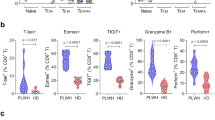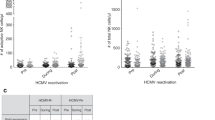Abstract
Human cells infected with viruses such as herpes simplex virus (HSV) or Epstein–Barr virus (EBV) become susceptible to the lytic action of a distinct population of lymphocytes termed natural killer (NK) cells present in the blood of normal (sero-negative) and sero-positive individuals1,2. Although NK cells probably represent a subset within the T-cell lineage3,4, they are apparently not restricted in their lytic activity by the major histocpmpatibility complex (MHC) determinants as are most cytotoxic T lymphocytes (CTLs; ref. 5), but can potentially lyse a variety of unrelated virus-infected6 or uninfected cultured cells4,7. In studies with murine models, it has been demonstrated that HSV8,9 or murine cytomegalovirus (MCMV) specific10,11 CTLs show the phenomenon of H–2 restriction initially described by Doherty and Zinkernagel with the LCM virus system12, which is that the CTLs and targets must share H–2K or H–2D products. However, studies in man have not demonstrated the existence of HSV- or human cytomegalovirus (HCMV)-specific CTLs showing HLA (human analogue of mouse H–2) restriction in their lytic activity towards virally infected targets. We demonstrate here that T cells from the peripheral blood of patients recently cured of HSV or HCMV infections, when triggered in vitro with specific antigen and grown as long-term cultures in the presence of T-cell growth factor (TCGF), can mediate virus-specific and HLA-restricted lysis of virus-infected targets. We believe this to provide the first evidence that HLA-restricted and virus-specific T-cell mediated cytotoxicity can be demonstrated in human–HSV and HCMV systems. These HSV- or HCMV-specific CTLs could be important in limiting the in vivo spread of the respective viruses and/or in the pathogenesis of the disease caused by them.
This is a preview of subscription content, access via your institution
Access options
Subscribe to this journal
Receive 51 print issues and online access
$199.00 per year
only $3.90 per issue
Buy this article
- Purchase on Springer Link
- Instant access to full article PDF
Prices may be subject to local taxes which are calculated during checkout
Similar content being viewed by others
References
Ching, C. & Lopez, C. Infect. Immun. 26, 49–56 (1979).
Blazar, B., Patarroyo, M., Klein, E. & Klein, G. J. exp. Med. 151, 614–627 (1980).
West, W. H., Cannon, G. B., Kay, H. D., Bonnard, G. D. & Herbermann, R. B. J. Immun. 48, 355–361 (1977).
Bakacs, T., Gergely, P. & Klein, E. Cell. Immun. 32, 317–328 (1977).
Doherty, P. C., Blanden, R. V. & Zinkernagel, R. M. Transplantn Rev. 29, 89–124 (1976).
Santoli, D., Trinchieri, G. & Lief, F. S. J. Immun. 121, 526–538 (1978).
Kall, M., Koren, H. S. Cell. Immun. 40, 58–68 (1978).
Sethi, K. K. & Brandis, H. Z. Immunforsch. exp. Ther. 150, 162–173 (1977).
Pfizenmaier, K., Starzinski-Powitz, A., Röllinghoff, M. & Wagner, H. Nature 256, 630–632 (1977).
Quinnan, G. V., Manischewitz, J. E. & Ennis, F. A. Nature 273, 541–543 (1978).
Sethi, K. K. & Brandis, H. Archs Virol. 60, 227–238 (1979).
Zinkernagel, R. M. & Doherty, P. C. Nature 248, 701–702 (1974).
Bøyum, A. Scand. J. clin. Lab. Invest. 21, 31–50 (1968).
Lay, W. H., Mendes, N. F., Bianco, C. & Nussenzweig, V. Nature 230, 531–532 (1971).
Chess, L., MacDermott, R. P. & Schlossmann, S. F. J. Immun. 113, 1113–1121 (1974).
Morgan, D. A., Ruscetti, F. W. & Gallo, R. C. Science 193, 1007–1008 (1976).
Strausser, J. L. & Rosenberg, S. A. J. Immun. 121, 1491–1495 (1978).
Therkelsen, A. J. Acta path. microbiol. scand. 61, 317 (1964).
McMichael, A. J., Zweerink, H. J. & Askonas, B. A. Nature 270, 524–526 (1977).
Biddison, W. E. & Shaw, S. J. Immun. 122, 1705–1709 (1979).
Kreth, H. W., terMeulen, V. & Ecker, G. Med. Microbiol. Immun. 165, 203–214 (1979).
Wright, L. L. & Levy, N. L. J. Immun. 122, 2379–2387 (1979).
Lipinski, M. et al. J. exp. Med. 150, 1310–1322 (1979).
Rickinson, A. B., Wallace, L. E. & Epstein, M. A. Nature 283, 865–867 (1980).
McMichael, A. J. exp. Med. 148, 1458–1467 (1978).
Pfizenmaier, K., Jung, H., Starzinski-Powitz, A., Röllinghoff, M. & Wagner, M. J. Immun. 119, 939–944 (1977).
Author information
Authors and Affiliations
Rights and permissions
About this article
Cite this article
Sethi, K., Stroehmann, I. & Brandis, H. Human T-cell cultures from virus-sensitized donors can mediate virus-specific and HLA-restricted cell lysis. Nature 286, 718–720 (1980). https://doi.org/10.1038/286718a0
Received:
Accepted:
Issue Date:
DOI: https://doi.org/10.1038/286718a0
This article is cited by
-
Phenotypic heterogeneity of cerebrospinal fluid-derived HIV-specific and HLA-restricted cytotoxic T-cell clones
Nature (1988)
-
Harvesting of leukocytes from intestinal lumen in murine giardiasis and preliminary characterization of these cells
Digestive Diseases and Sciences (1985)
-
Serum suppression of lymphocyte activationin vitro in acquired immunodeficiency disease
Journal of Clinical Immunology (1983)
-
The role of the human major histocompatibility complex in cytotoxic T-cell responses to virus-infected cells
Journal of Clinical Immunology (1982)
Comments
By submitting a comment you agree to abide by our Terms and Community Guidelines. If you find something abusive or that does not comply with our terms or guidelines please flag it as inappropriate.



